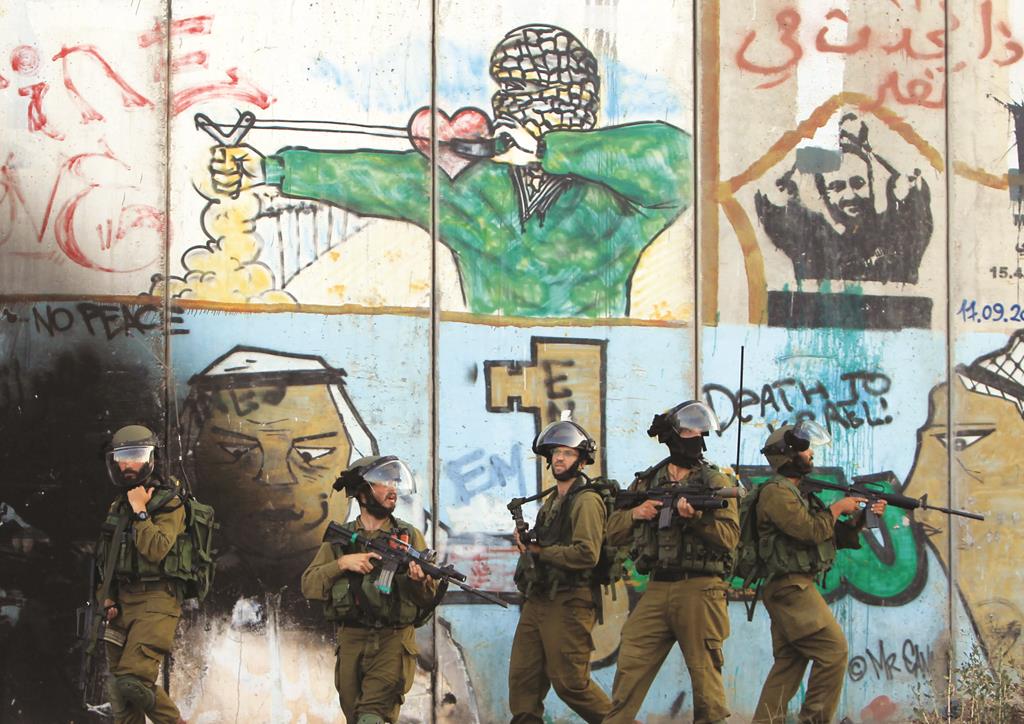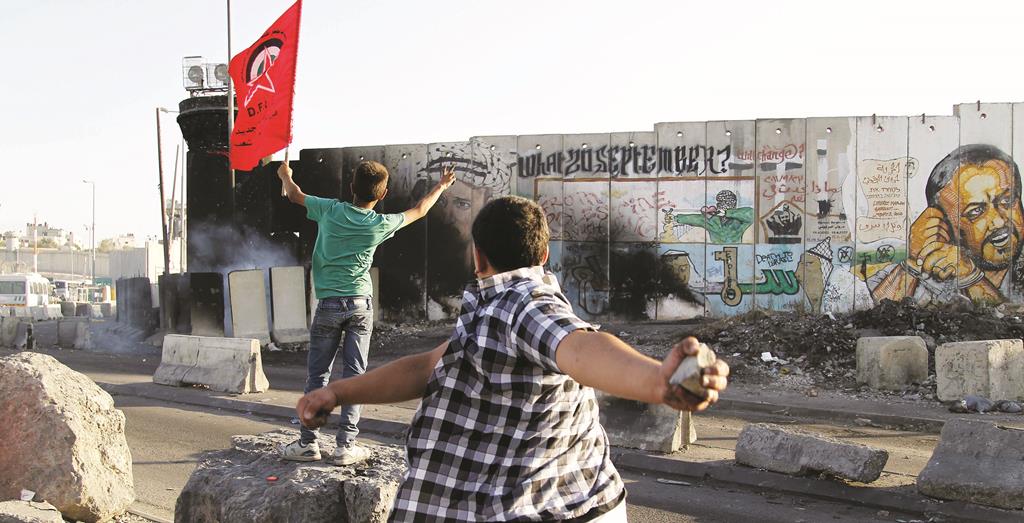Last Minute Agreement to Extend Ceasefire


It was the eleventh hour when word finally came from Cairo on late Wednesday night that the Israelis and Palestinians had agreed to extend the ceasefire, this time for an additional five days.
Just minutes before midnight, when the ceasefire was set to expire, Egyptian mediators announced that the talks had been salvaged.
There was no official comment from Israel as the midnight deadline passed.
An official source informed Hamodia, however, that although the two sides had reached no agreement, they had acceded to Egyptian and American urgings to keep talking.
When the Israeli delegation returned to Yerushalayim, they told the government that the Egyptians had made serious efforts to persuade the Palestinians to accept Israeli concessions on border crossings and funding for Hamas salaries. They argued that those concessions could be presented publicly as significant gains, but Hamas wouldn’t go along.
Cabinet ministers expressed frustration, however, over being “kept out of the loop” on developments in Cairo. A poll by telephone of cabinet members for the purpose of ratifying the decision to join the new ceasefire was being urgently arranged, according to Ynet.
A senior Hamas official in Cairo confirmed the news in a statement saying, “The ceasefire has been extended in order to continue the discussions.”
Earlier, as the clock was running out on the ceasefire talks in Cairo without an agreement and Israeli and Palestinian delegations departed the city, air raid sirens could already be heard again in the south on Wednesday evening, hours before the midnight deadline.
IDF forces had been moving into position earlier in the day on the border with Gaza in anticipation of an unsatisfactory outcome in Cairo. Additional reservists were being called up to bolster the troops in the south, and a tense atmosphere prevailed among the units on standby.
Hamas leader Ismail Haniyeh reiterated on Wednesday that Hamas would only accept a permanent ceasefire if the Israeli blockade was lifted on the Gaza Strip, a demand that Israel has rejected.
However, his wording indicated that another temporary ceasefire might still be attainable. Hamas denial of responsibility for rockets violating the waning but still in-effect ceasefire was another signal that resumption of hostilities could still be averted.
A Hamas source declared even before the temporary ceasefire expired that negotiations had failed, although “last minute efforts are still underway” to reach at least a short term agreement.
A press conference scheduled by the Palestinians for 9:30 p.m. Wednesday in Cairo, presumably to announce the collapse of the talks, was postponed until further notice. This was reportedly at the behest of the Egyptians who were pushing for another 72-hour ceasefire.
President Barack Obama was on the phone with Prime Minister Binyamin Netanyahu on Wednesday to press for a short-term extension of the truce if a more permanent arrangement could not be obtained.
“What we want is a more sustainable, longer-term ceasefire,” State Department deputy spokeswoman Marie Harf told reporters, “or, absent that, an extension of the current, temporary one.”
In line with Israel’s demand, a “long-term goal” of the United States remains the disarmament of Hamas, Harf said, but would not elaborate on how that figured in the Cairo talks, if at all, where the U.S. is represented.
The U.S. is also committed to the reconstruction of the Gaza Strip, Harf added.
“We’re starting to have conversations with people, but obviously, that would be further down the road,” she said.
Rockets were fired from Gaza Wednesday night, less than two hours before the midnight deadline to the 72-hour cease-fire.
One rocket struck open territory in the Sha’ar Hanegev Regional Council, the IDF confirmed. No damage or injuries were reported.
Earlier on Wednesday, Foreign Minister Avigdor Lieberman said that if the ceasefire were not extended past midnight, then Israel should put an end now to the terrorists in Gaza, The Jerusalem Post reported.
“Israel cannot allow itself a war of attrition,” Lieberman said at a meeting with local council heads from the south held in Ashkelon. “We must subdue them, even at the price of escalation.” He said Israel could not accept a situation in which it could not decisively defeat 26,000 terrorists in Gaza.
After more than a month of Operation Protective Edge, he said, “it is time to say ‘enough.’”
Lieberman added that Protective Edge must not be halted until Hamas returns the bodies of two Israeli soldiers, Oron Shaul and Hadar Goldin, Hy”d, killed in Gaza. He threatened that Israel would assassinate top Hamas leaders Ismail Haniyeh and Mohammed Deif if Hamas did not return the bodies.
Regarding the central demand for disarmament in Gaza, Intelligence Minister Yuval Steinitz said Wednesday that no Israeli government will consider any concessions or a peace settlement unless the Hamas-ruled enclave is demilitarized.
Steinitz, speaking at a press conference in Yerushalayim, said that it was bad enough that the weapons buildup in Gaza was a gross violation of the Israeli-Palestinian interim agreement Palestinian Authority President Mahmoud Abbas signed some 20 years ago, but that an armed, tunnel-ridden Gaza would be an insurmountable obstacle to any longterm diplomatic progress with the Palestinians.
Advocates of a two-state solution should insist on the demilitarization of Gaza, because otherwise Israel could not possibly withdraw from Yehudah and Shomron and allow the region to be used as a staging area for terrorist operations like Gaza, Steinitz said.
Former president Shimon Peres challenged the international community to stand up to Hamas.
“The world needs to decide whether it’s ready for a terrorist state in Gaza or not,” Peres said in an interview with the BBC.
“Reconciling with terrorism in Gaza will be a tragedy for the Middle East and the entire world. Israel wants peace and believes in negotiations while Hamas — both philosophically and practically — proves that it is opposed to peace, opposed to talks, and in favor of terrorism.”
Palestinian sources said early Wednesday morning that Egypt had presented the Israeli and Palestinian delegations with a plan for a longterm ceasefire, according to Israel Radio.
The plan called for an end to Israel’s air strikes on Gaza, reducing the size of the buffer zone in Gaza along the Israeli border. But the most contentious issues, such as demilitarization of Gaza, versus Hamas insistence on removing the blockade, would be postponed until a later date.
No official version of the proposals were released.
This article appeared in print on page 1 of edition of Hamodia.
To Read The Full Story
Are you already a subscriber?
Click "Sign In" to log in!

Become a Web Subscriber
Click “Subscribe” below to begin the process of becoming a new subscriber.

Become a Print + Web Subscriber
Click “Subscribe” below to begin the process of becoming a new subscriber.

Renew Print + Web Subscription
Click “Renew Subscription” below to begin the process of renewing your subscription.












